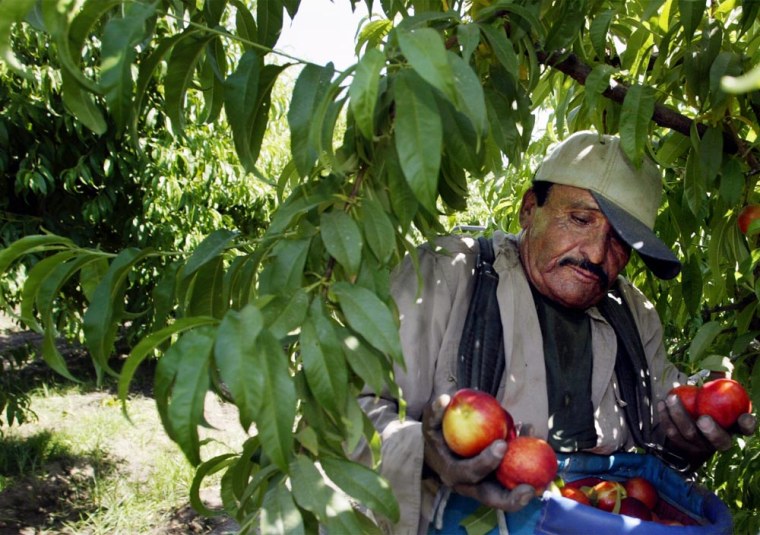Viviana Torres was leading her crew down a row of 100 peach trees when an awful stench started burning her nose. The farmworker, five months pregnant, had been caught in pesticide drift before. She pulled her shirt over her face.
“I was afraid, thinking about the baby,” Torres recalled.
Within moments, other workers were fainting, according to Torres. One woman lay down, as if to sleep. Torres, frantic, tried to get help via a cell phone. She finally reached the foreman. He told the workers to leave the field. They had breathed the fumes for 20 minutes, and 19 people were sick — gasping for air, nauseated, their eyesight blurry, some drifting in and out of consciousness, Torres said.
Every year, hundreds of farmworkers and families who live near fields are hurt by pesticides in California. And if the past is any guide, the victims of the May 2 incident in the town of Arvin will not get much help, farmworker advocates say.
Often, those affected do not get any compensation, not even to cover medical expenses, said Martha Guzman of the California Rural Legal Assistance Foundation.
Tracking the drift
In 2002, the last year for which numbers are available, 172 million pounds of pesticides were applied to fields across California. The chemicals drifted 39 times and sickened 478 people, according to the state Department of Pesticide Regulation. The department said there were 838 other cases of illnesses in which pesticides were a factor — adding up to 1,316 pesticide-related health problems that year.
A bill introduced this spring by state Sen. Dean Florez, the Pesticide Drift Exposure Response Act, would set up a fund, financed by fines imposed on companies that violate the law, to help pay for field workers’ medical care.
In the case of the Arvin workers, witnesses said they were hit when the wind changed after a helicopter sprayed a potato field a quarter-mile away.
Unsure what chemical it was dealing with, the fire department decontaminated the workers by having them take off their clothes and hosing them down.
Rescue workers later reached the county agricultural commissioner’s office and learned that Chuck’s Choppers, a pest control business, had applied an insecticide called Monitor 4 to a field owned by Grimmway Enterprises, a major grower, primarily of carrots.
Nerve gas relative
Monitor is related to nerve gas, said Marion Moses, a doctor who directs the San Francisco nonprofit Pesticide Education Center. Severe exposure can lead to unconsciousness, seizures, an inability to breathe, and death. But with medical attention, victims can recover well, Moses said. A one-time exposure probably will not hurt Torres’ baby, she said.
Of the 19 workers affected, 13 were taken to the hospital. The others did not want to go.
Since the pesticide drift caught the pickers at work, they could ask for workers’ compensation (an option not available to families accidentally sprayed at home). But the farmworkers are primarily poor, Hispanic immigrants who speak little English and are afraid of dealing with the government, advocates say.
“They don’t know about workers’ comp,” said Nancy Romero, a United Farm Worker representative who is helping the workers. “They don’t want to lose the day’s pay, they can’t afford to do that. They’re afraid of the companies and of losing their jobs.”
The Department of Pesticide Regulation is investigating and might fine those responsible, said Paul Helliker, department director.
“Any drift incident is something we’re concerned about,” said Helliker. “But there are over a million pesticide applications every year. The incidents of drift are around 40 per year, so that’s a relatively small number.”
Chuck’s Choppers manager Gene Thome said: “If there was an exposure, it’s unfortunate. We’re trying to investigate it ourselves.”
Contract pickers
The workers were harvesting peaches on an orchard operated by Sandhill Farms and were employed by three contractors. Calls to Sandhill Farms were not immediately returned.
Grimmway attorney Jeff Green said responsibility for any drift would fall to the sprayer. Green said the employer of the sickened workers has refused to provide Grimmway’s insurance company with their identities, and none of the workers have contacted the company.
“Any compensation in this case would be subject to a claim being filed,” Green said.
In a 2002 case of pesticide drift in Arvin that sickened 250 people, two years of litigation led to a settlement of $60,000 last January. Of that, $50,000 went to the Department of Pesticide Regulation, and $10,000 to the Kern County Agricultural Commissioner to cover investigative costs. The company, Western Farm Service, never admitted any wrongdoing, and the people affected got nothing.
“We can’t allow this to continue to happen,” said Arturo Rodriguez, president of the United Farm Workers. “The grower and the spraying outfit need to be held accountable, and to make sure the workers get the medical care they need, especially the women who were pregnant.”
Torres said she is thinking of gathering her crew and suing Grimmway — “not to get rich, but just to show that these things shouldn’t happen.”
“How many millions of dollars do they make on the produce that we plant, take care of, harvest?” she asked. “We need our place here, too.”
